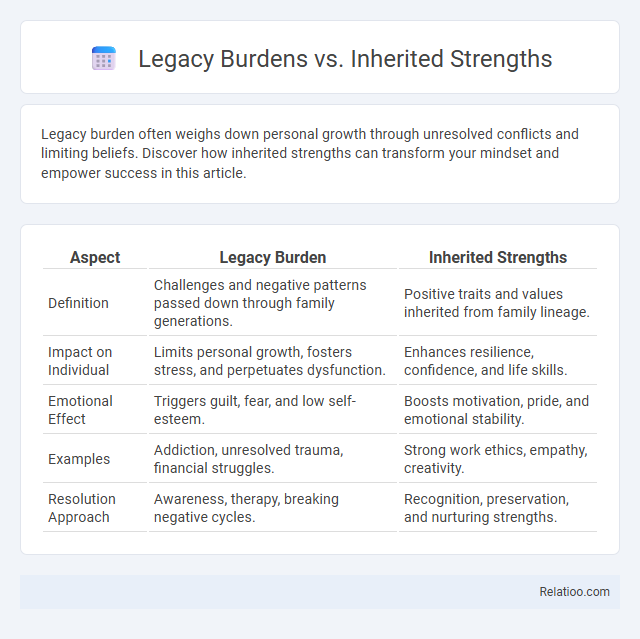Legacy burden often weighs down personal growth through unresolved conflicts and limiting beliefs. Discover how inherited strengths can transform your mindset and empower success in this article.
Table of Comparison
| Aspect | Legacy Burden | Inherited Strengths |
|---|---|---|
| Definition | Challenges and negative patterns passed down through family generations. | Positive traits and values inherited from family lineage. |
| Impact on Individual | Limits personal growth, fosters stress, and perpetuates dysfunction. | Enhances resilience, confidence, and life skills. |
| Emotional Effect | Triggers guilt, fear, and low self-esteem. | Boosts motivation, pride, and emotional stability. |
| Examples | Addiction, unresolved trauma, financial struggles. | Strong work ethics, empathy, creativity. |
| Resolution Approach | Awareness, therapy, breaking negative cycles. | Recognition, preservation, and nurturing strengths. |
Understanding Legacy Burden: Definition and Impact
Legacy burden refers to the psychological and emotional weight carried from past generations, often manifesting as unresolved trauma, limiting beliefs, or systemic disadvantages passed down within families or communities. This burden influences individual behaviors, decision-making, and mental health by embedding inherited stressors and unresolved conflicts into personal identity and life choices. Understanding legacy burden is crucial for recognizing patterns that hinder personal growth and for developing strategies to transform inherited challenges into opportunities for healing and empowerment.
What Are Inherited Strengths?
Inherited strengths are the positive traits, skills, and resilience passed down through generations, shaping your ability to overcome challenges and thrive. These strengths include emotional intelligence, cultural values, and adaptive coping mechanisms that influence personal growth and family dynamics. Understanding your inherited strengths helps harness the potential embedded within your lineage to create a foundation for success and well-being.
The Origins of Legacy Burdens
Legacy burdens originate from unresolved traumas, beliefs, and behaviors passed down through generations, influencing your emotional and psychological makeup. Inherited strengths consist of adaptive skills, resilience, and positive traits transmitted alongside challenges, balancing the impact of these burdens. Understanding transgenerational patterns reveals how these legacies shape family dynamics and personal development over time.
How Inherited Strengths Shape Identity
Inherited strengths play a critical role in shaping your identity by providing foundational qualities such as resilience, creativity, and emotional intelligence passed down through generations. These strengths influence how you respond to challenges and opportunities, reinforcing positive patterns that contribute to personal growth and self-awareness. Recognizing and embracing these inherited assets allows you to build a stronger sense of self and navigate your life's path with confidence.
Recognizing Legacy Burden in Daily Life
Recognizing legacy burden in daily life involves identifying emotional, financial, or behavioral challenges passed down through generations that hinder personal growth and well-being. These burdens may manifest as unresolved traumas, limiting beliefs, or systemic inequalities deeply embedded in family history. Awareness of these inherited obstacles enables individuals to consciously address and transform patterns for healthier future generations.
Transforming Legacy Burdens into Growth Opportunities
Transforming legacy burdens into growth opportunities involves recognizing inherited patterns that hinder progress and consciously reshaping them to foster resilience and innovation. By examining transgenerational patterns, individuals and organizations can identify recurring challenges and leverage inherited strengths to build adaptive strategies. This process turns past limitations into catalysts for personal and collective development, promoting sustainable growth across generations.
Harnessing Inherited Strengths for Success
Harnessing inherited strengths involves identifying and leveraging the positive traits, skills, and wisdom passed down through generations to fuel your personal and professional success. Understanding transgenerational patterns allows you to break free from legacy burdens such as limiting beliefs or maladaptive behaviors while amplifying strengths like resilience, creativity, and resourcefulness. By consciously applying these inherited advantages, you create a foundation for growth that aligns with your unique goals and maximizes your potential.
The Interplay Between Legacy Burden and Inherited Strengths
Legacy burden and inherited strengths coexist within family systems, influencing individual behavior and resilience. While legacy burden encompasses unresolved traumas and limitations passed down, inherited strengths represent adaptive qualities and cultural wisdom that empower descendants. Their interplay shapes psychological outcomes, where the recognition and integration of strengths can mitigate the adverse effects of burdens in transgenerational patterns.
Strategies to Overcome Legacy Burden
Strategies to overcome legacy burden involve identifying and consciously dismantling negative transgenerational patterns that have been unconsciously inherited within your family or community. Emphasizing the cultivation of inherited strengths through mindful reflection, therapy, and positive affirmations can help replace limiting beliefs with empowering narratives. You can break the cycle by fostering resilience, practicing emotional intelligence, and seeking support networks that promote growth and healing across generations.
Embracing Inherited Strengths for Personal Empowerment
Embracing inherited strengths allows individuals to tap into transgenerational patterns of resilience, wisdom, and skills, transforming legacy burdens into sources of personal empowerment. Recognizing and leveraging these ancestral gifts fosters a stronger self-identity and boosts emotional and psychological well-being. This conscious alignment with inherited strengths cultivates growth, healing, and the ability to overcome intergenerational challenges.

Infographic: Legacy Burden vs Inherited Strengths
 relatioo.com
relatioo.com